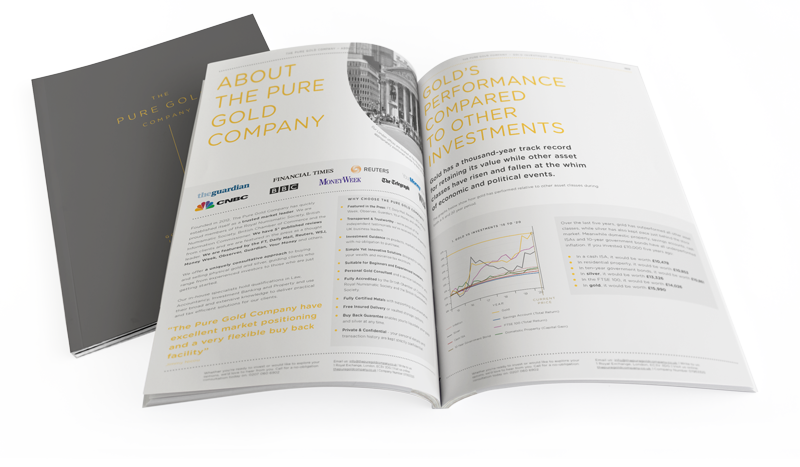The turn of the century has seen a significant shift in the moral compass of the world. The majority regarded sustainability and environmental activism as a niche, hippie crusade. But companies are finally taking up the baton, following pressure from investors and regulators to report on Environmental, Social and Governance (ESG) performance.
Today, the climate crisis and ESG agenda is at the forefront in all areas of life. From personal recycling choices to shareholder activism. People and the companies they run and work for want accountability and transparency in all areas of ESG. So where does gold fit in this new world order? How has the gold industry responded to the challenge of making ESG improvements? Can investors buy gold with a clear conscience?
Gold mining
The biggest impact of gold investment comes from the mining process. Extracting gold is, by its nature, destructive to the environment. It uses chemicals and industrial processes that can be toxic. It has led to injuries and deaths of mine workers, and been linked with social conflict. These are the areas gold miners need to be improving to become an ethical investment, and there has been some solid progress.
Social impact
Some of the key social impacts gold miners have focussed on include: health and safety, impact on local communities, inclusion and diversity, and human rights. Mining companies have put their workforce at the forefront of the ESG agenda over the last few decades. They are working hard to safeguard their people and limit fatalities and injuries. They report on Lost Time Injury Frequency Rate (LTIFR) on their website as an indicator of health and safety. This allows ethical investors to check for improvements. The COVID-19 pandemic has also meant more focus on the health of employees and ensuring their safety.
As ESG reporting is now mandatory in most instances. Companies can use many frameworks to measure and assess their performance. The UN Sustainable Development Goals (SDGs) have become a cornerstone of ESG principles and practices. Gold companies are increasingly adhering to these, or other stringent frameworks for sustainability. The World Gold Council last year published a report that highlighted the advances gold miners were making in this area. From investment in water resources within local communities to job creation and gender inclusivity.
Environmental principles
Mitigating the effect of mining in the immediate area and wider communities is a priority for ethical gold miners. They are making an effort to change their practices and protect the natural environment around them. The World Gold Council report describes the ways companies are working to reduce their energy and water consumption. Also how to improve water access and sanitation in their local area.
There are many ways gold companies can show their commitment to environmental improvements. They can voluntarily adhere to the International Cyanide Management Code. This sets out safer procedures for managing the toxic chemical – a key component of gold extraction. There are several codes of conduct that mining companies can sign up to show their commitment to better working practices. These include the ISO 14001 Environmental Management System and the International Council on Mining and Metals Sustainable Development Framework.
Further research by the World Gold Council demonstrates how the gold industry can mitigate the effects of climate change. Including its role in moving towards a net-zero emissions future.
More to be done
These focused efforts to improve the environmental and social impact of gold mining are a move in the right direction, but there is still more to do. A report published by the Responsible Mining Foundation and the Columbia Center on Sustainable Investment found that except for a few frontrunners, the mining companies included in the report had not integrated the UN SDGs into their business strategy with any real depth. ESG principles are becoming more visible and accountable. Gold companies will need to be doing even more for the environment and societies around them if they want to attract ethical investors.
Conflict gold
Large gold mining companies are accountable to shareholders or other major stakeholders. But there exists a network of artisanal and small-scale miners (ASMs) that operate beyond the transparent frameworks built up around big corporate miners. They have been linked to conflict, theft, corruption, or toxic gold mining practices. They also have higher rates of injury and a detrimental effect on local communities. Well-regulated markets, like the gold market in London, have already implemented audit procedures to ensure no circulation of conflict gold.
Gold refiners, which buy gold from the miners and turn it into coins and bars for certified sale, are obligated to ensure their supply chains are free of conflict gold. The London Bullion Market Association (LBMA), which oversees the London gold market, runs a mandatory independent audit programme. This verifies the legitimacy of the gold and silver supply chains of refiners on its Good Delivery List. Which in turn allows the gold to be sold on the London market. A refiner is removed from the list and its gold won’t be approved for settlement of London gold contracts if it isn’t able to show strict due diligence at all points in its supply chain. In this way, gold investors who buy on the London market are assured of the provenance of their ethically sourced gold.
Fairtrade jewellery
The Fairtrade Foundation, which monitors and certifies everything from chocolate to bananas, also certifies gold in the same way. It ensures the gold-bearing its hallmark is sourced ethically from small-scale miners that receive a fair deal for their work. They have a list of certified jewellers for those who want to buy with ethical certainty.
Buying ethical gold
The shifting tide of the market and social sentiment towards sustainability and a focus on environmental, social and governance principles has gained critical mass. Although investors don’t have to insist on their gold purchases being ethical, they are increasingly doing so. The LBMA standards work towards ensuring artisanal and small-scale mining is conflict-free. Meanwhile, statutory reporting and investor demand are pushing mining companies to lift ESG to the top of their agenda. The more momentum it gains, the more it polishes gold’s reputation as a safe and ethical investment.


